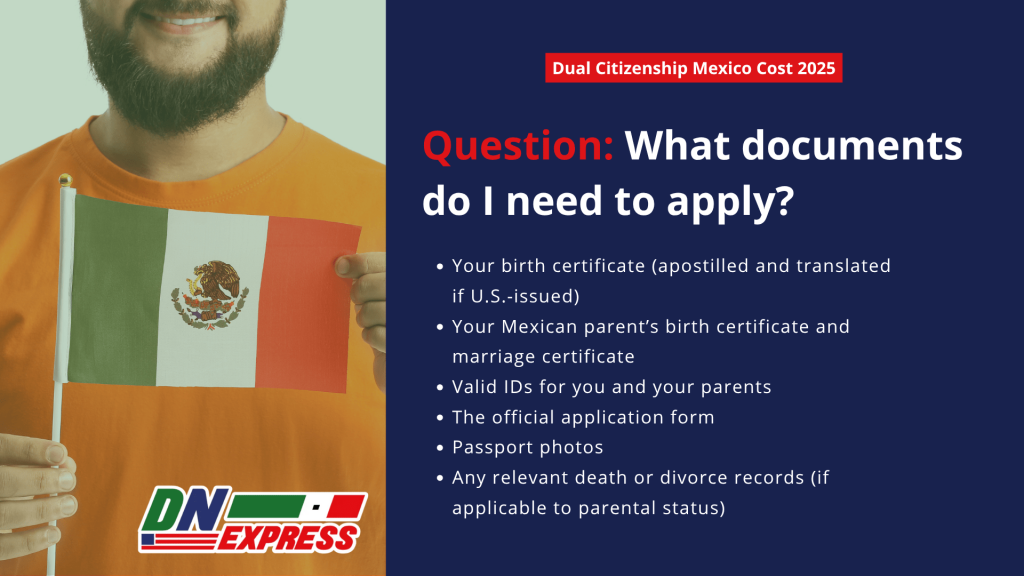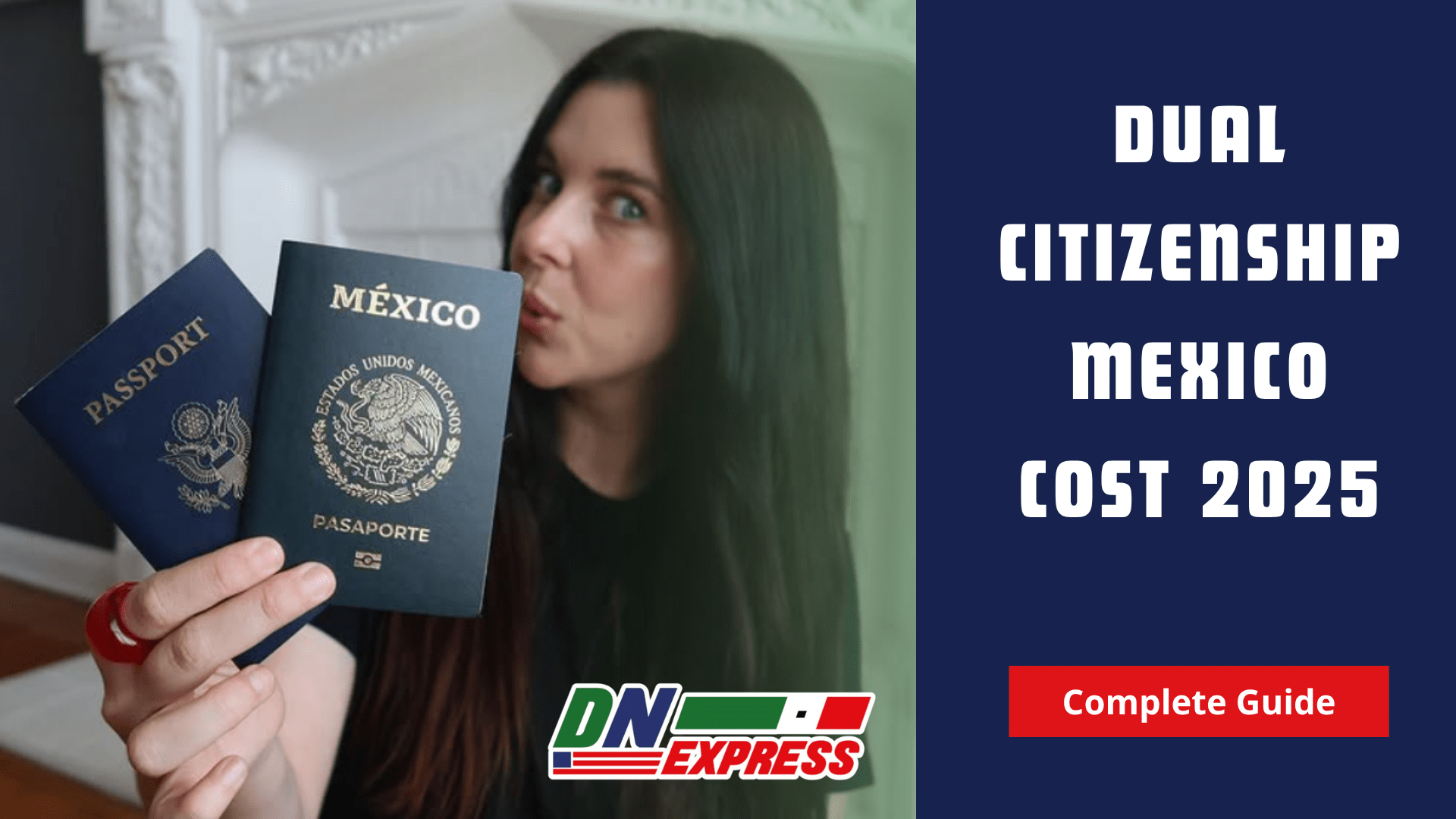
Dual citizenship with Mexico is often advertised as “free”, but the real costs vary based on your situation. From birth certificate errors to rejected consulate cases, here’s what you’ll pay (in time or money) to secure Mexican nationality as a U.S. citizen.
If You Were Born Outside Mexico to Non-Mexican Parents
You’ll need to go through the naturalization process, which requires 2–5 years of legal residency in Mexico, a visa obtained outside the country, and passing Spanish and civics exams. The government fee is 8,755 pesos (about $500 USD), plus costs for apostilles, translations, and documentation.
If You Qualify Through a Mexican Parent or Birthright
Citizenship is free for those born to at least one Mexican parent, whether you're an adult reclaiming it or a child being registered. While you won’t pay the government fee, you may still incur costs for translations, document corrections, or legal recovery of missing records.
Your actual cost may rise depending on factors like document corrections, consulate access, or eligibility issues. Some people qualify easily. Others face unexpected legal or paperwork hurdles that delay or derail the process entirely.
We help you cut through that complexity.
Whether you’ve been rejected at a consulate, are missing key documents, or simply want to avoid the bureaucracy, our licensed legal team handles everything, from eligibility to final approval, without ever setting foot in a consulate.
If you're wondering how much your situation might cost, what documents you'll need, or whether hiring help is worth it, this article has the answers. Let’s break it all down.
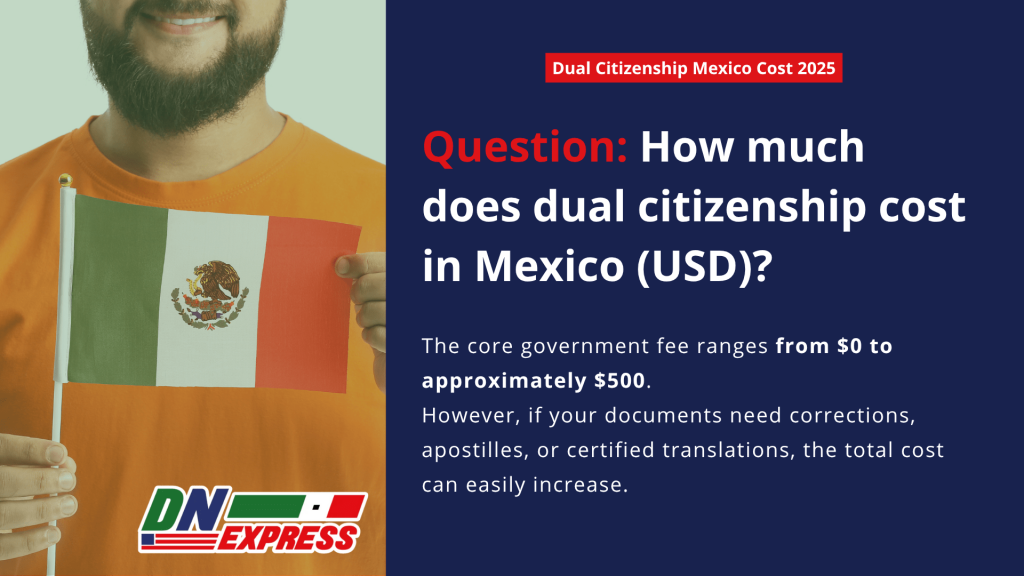
How Much Does It Cost to Get Mexican Dual Citizenship?
If you're applying as a U.S. citizen of Mexican descent, you may qualify for a fee waiver. But that’s only the starting point.
In reality, the true cost depends entirely on your situation.
What documents you already have, whether they’re accurate, and how complex your case is. Some applicants sail through the process. Others face document corrections, consular delays, or eligibility surprises that can add hundreds of dollars and months of waiting.
Here’s what that looks like depending on your case type:
-
U.S.-born children of Mexican parents:
If your documents are clean and your parents’ Mexican nationality is properly registered, your only costs might be for passport issuance and translations, a relatively affordable process.
-
Adults fixing birth certificate errors to qualify:
If your name doesn’t match across U.S. and Mexican documents, or your parent’s birth certificate is missing or incorrect, you’re looking at $300–$800+ in legal and correctional fees. These cases often require apostilles, certified translations, and formal registry amendments.
-
People denied or ignored by consulates:
Rejections are common when applying solo, especially if paperwork isn’t perfectly aligned. Many people turn to services like Doble Nacionalidad Express for professional legal help, at $350–$450, it’s a cost-effective solution that prevents you from starting over.
-
Mexican citizens registering their foreign-born children:
These cases are typically low-cost, but efficiency varies by consulate. Some parents report success in a few weeks, others face long waits and multiple appointments. Hidden costs may include certified translations or notarized declarations.
-
Individuals reclaiming heritage through grandparents:
Many people believe that Mexican citizenship is only possible through a parent, but that’s not the full story. While it’s true that citizenship isn’t automatically granted just because your grandparent was Mexican, DNExpress can help. First, we must prove the direct bloodline, and yes, it's possible without going through the consulate. If your parent never claimed their citizenship, or if records are missing, we know how to reconstruct the paper trail legally.
-
Spouses of Mexican citizens:
If you’re married to a Mexican national, you can apply for naturalization after 2 years of legal residency. A fee of 8,755 Mexican pesos (approximately $500 USD) may apply, along with additional paperwork like your marriage certificate, proof of cohabitation, and entry/exit records showing consistent presence in Mexico.
Knowing which category you fall into can help you anticipate what you’ll pay, how much time and energy the process might take.
Here’s good news.
Every scenario is solvable, and we’ll help you navigate it.
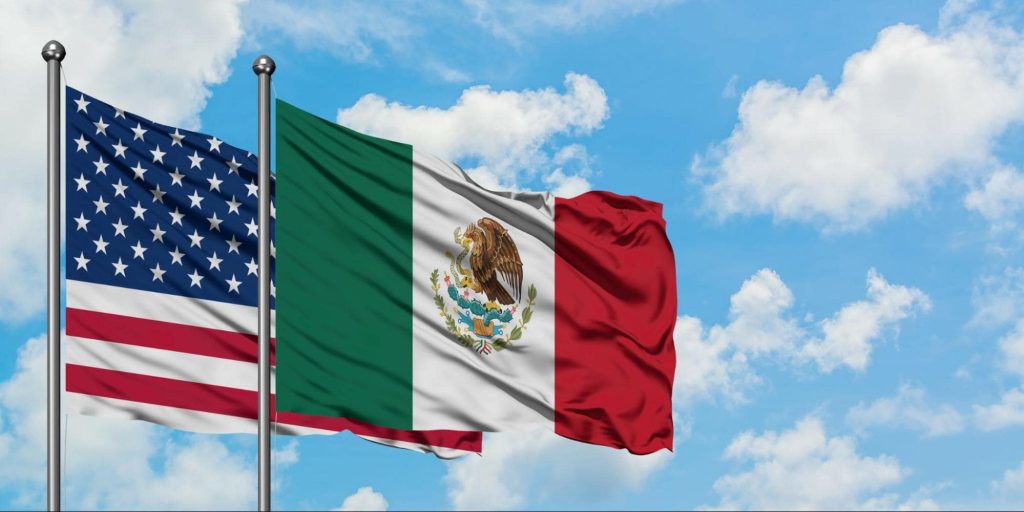
Why “Free” Isn’t Always Free: The Hidden Costs
Mexican dual citizenship, in theory, is a right, and rights don’t come with a price tag. But just because the government fee is minimal or waived in certain cases doesn’t mean the path is actually free. In practice, many people end up paying well beyond their expectations, not in official fees, but in time, frustration, and legal corrections.
Here are some of the most common hidden costs that catch families off guard:
-
Time wasted on unclear consular rules:
Each Mexican consulate operates a little differently. Some require in-person appointments months in advance, others reject documents for minor formatting issues. If you don’t know exactly what’s expected, you can lose weeks, or even have to start over entirely.
-
Correcting errors in birth, marriage, or death certificates:
One misplaced accent mark, a missing surname, or a mismatched birthdate can derail your entire application. Legal corrections often involve working with U.S. and Mexican civil registries, hiring translators, and paying fees to reissue documents, costs that can add up fast.
-
Long wait times for appointments or mail delivery:
Some clients wait 6–12 months to get a passport appointment or response from a consulate. Others have had documents get lost in international mail, forcing them to pay for rush replacements.
-
The emotional toll of rejection:
We’ve seen clients break down in tears after being told they “don’t qualify” because of paperwork that was mishandled or misunderstood. Many were eligible all along, but the system made them feel otherwise.
“Consulates always find something wrong…and fixing it may not always be so simple or cheap”, one client shared during her case review, clearly frustrated with her experience going it alone.
We don’t believe anyone should have to deal with that kind of uncertainty. That’s why we offer clear pricing, fast turnaround, and remote legal handling, so you never have to guess or gamble your identity.
Common Document Issues That Can Drive Up Your Costs
Even when you qualify for dual citizenship, paperwork problems are where most applicants hit a wall, and where unexpected costs start stacking up. If your documents are incomplete, inconsistent, or missing, you may need legal fixes before you can even begin the application.
Here are some of the most common document-related issues that increase time and expenses:
-
Apostilles for U.S. documents:
If your birth or marriage certificates were issued in the U.S., they need to be apostilled to be recognized in Mexico. Each apostille costs money and can take weeks, especially if you’re requesting them by mail.
-
CURP registration or corrections:
The Clave Única de Registro de Población (CURP) is Mexico’s equivalent of a Social Security number. If it doesn’t exist, or was issued incorrectly, you’ll need to apply or fix it before moving forward.
-
Name spelling discrepancies:
Names like “Juan Carlos” vs. “Juan C.” or missing middle names across U.S. and Mexican records can result in application rejections. These are legal identity issues that often require formal corrections.
-
Translations by certified Mexican translators:
Mexico doesn’t accept informal translations. Your U.S. documents must be translated by a certified perito traductor in Spanish, another cost applicants often forget to factor in.
-
Multiple copies of civil registry documents:
You’ll need original or certified copies of documents from both countries, not scans or photos. If your case involves multiple family members, expect to multiply those costs.
📌 Pro Tip: If your parents never registered their own Mexican birth certificate, especially common for older generations, you may need to track down and legalize their records before applying.
This alone can add several weeks and fees to your timeline.
We review all your documents up front and flag any issues before they become roadblocks. It’s not just about paperwork, it’s about protecting your time, money, and the dignity of your legal identity.
DIY vs. Hiring a Professional: What’s the Difference?
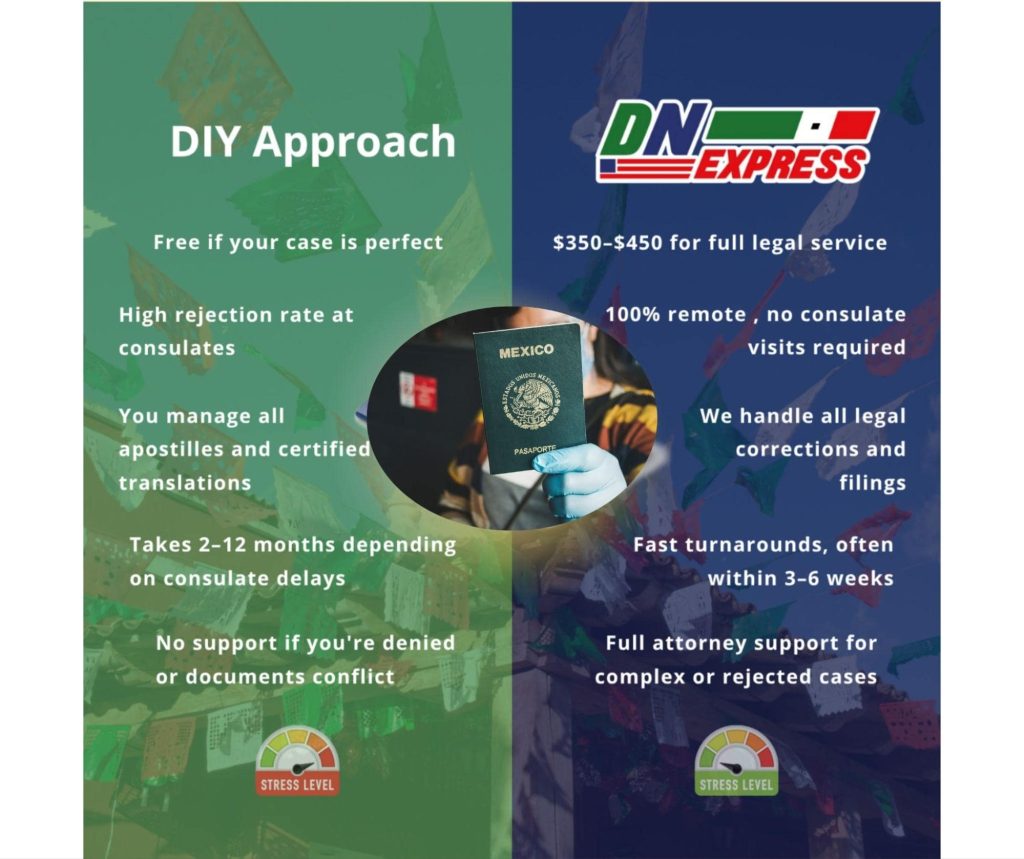
When people hear that dual citizenship is “free,” they often assume they can (and should) do it themselves. And in some cases, that’s true, if your documents are flawless and you have the time to navigate government processes. But for most families, especially those with cross-border records or past denials, going solo leads to frustration and costly delays.
“They told me I didn’t qualify because my parents married after I was born. I didn’t know that mattered!”
A common frustration we hear from applicants who tried the consulate route
When you choose DNExpress, you’re not gambling with your eligibility. We identify red flags before they cause delays, fix legal issues you may not even know exist, and get your citizenship approved without stepping foot in a consulate. For many families, that peace of mind is worth every penny.
Why Work with Doble Nacionalidad Express?
Our purpose goes beyond paperwork, we help people reclaim their roots, their rights, and their sense of belonging.It’s about identity, legal status, and family legacy. We exist to make that process accessible, reliable, and dignified for every person of Mexican descent in the U.S.
Here’s what makes us different:
- No Consulate Visits Required: We complete the entire citizenship process remotely, no travel, no waiting rooms, no last-minute cancellations.
- Handled by Licensed Mexican Attorneys: Unlike document prep services, your case is reviewed and managed by real attorneys with cross-border legal experience.
- Flat Pricing, No Hidden Fees: We believe legal identity should be affordable. Our pricing is transparent, inclusive, and backed by a refund policy.
- Expert in Rejected & Complex Cases: Told “no” before? We’ve helped thousands get approved after previous denials or documentation issues.
- Full U.S. and Mexico Coverage with Local Agents: We have staff on both sides of the border, and agents in every Mexican state, ready to find, correct, or recover your documents.
- Fast, Clear Communication: Our bilingual team is available by phone, WhatsApp, email, and online appointments. You’ll never be left guessing.
- Trusted by Over 8,000 Families: We’ve helped clients from Los Angeles to Houston to Chicago get their dual citizenship, often faster than they thought possible.
“DNExpress made the process so easy. I thought my case was hopeless, but they got it done fast and explained everything clearly.”
Laura M., Los Angeles

Is It Worth the Price?
If your time, peace of mind, and legal identity matter to you, the answer is yes.
Yes, dual citizenship may be your right. Yes, you could try doing it yourself.
But ask yourself.
How much is it worth to avoid getting rejected over a name discrepancy? How much time are you willing to lose tracking down apostilles, waiting on consulates, or figuring out legal translations on your own?
With professional support, you're investing in certainty. You’ll know your documents are correct, your eligibility is confirmed, and your case is in expert hands.
Families who work with us know they’re restoring something bigger: identity, opportunity, and legacy.
If that’s what you’re after, we’re ready to help you claim it.
Frequently Asked Questions About Dual Citizenship Costs
Q: How much does dual citizenship cost in Mexico (USD)?
The core government fee is approximately $500 USD. However, if your documents need corrections, apostilles, or certified translations, the total cost can easily reach $1,000 or more, especially for complex cases.
Q: How hard is it to get?
That depends entirely on your paperwork. If you're a child of Mexican nationals and your documents are aligned, the process is straightforward. But name mismatches, missing records, or unregistered parental documents can slow things down significantly, and increase your legal and emotional costs along the way.
Q: What documents do I need to apply?
Most applicants will need:
- Your birth certificate (apostilled and translated if U.S.-issued)
- Your Mexican parent’s birth certificate and marriage certificate
- Valid IDs for you and your parents
- The official application form
- Passport photos
- Any relevant death or divorce records (if applicable to parental status)
Q: Is it worth it to become a dual citizen?
Absolutely. Mexican dual citizenship gives you:
- The ability to own land without restrictions.
- Access to national healthcare and education.
- A second passport that opens doors across Latin America and Europe.
- Voting rights and civic participation in Mexico.
- The ability to pass citizenship to your children, preserving family legacy
We do more than process forms, we help you claim everything dual citizenship makes possible, legally and permanently.
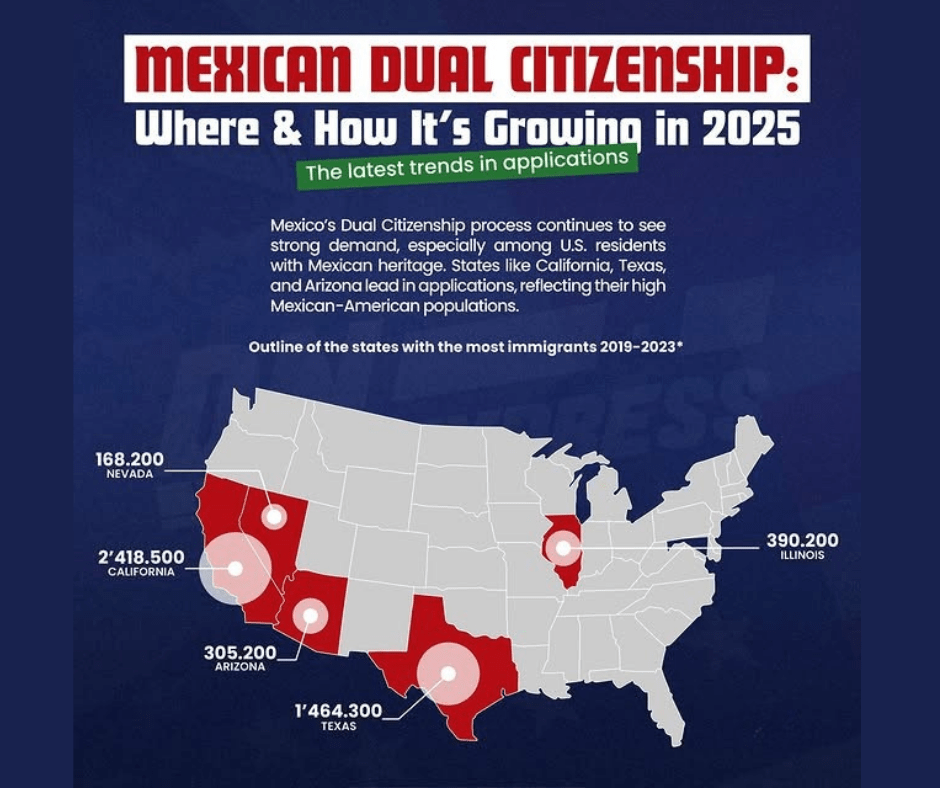
Ready to Take the First Step?
We’ve walked you through the real costs of Mexican dual citizenship, financial, legal, and emotional. If you’re ready to stop guessing and start the process with clarity, here’s how to begin:
Gather your key documents
Birth certificates, IDs, and any supporting records for yourself and your parents.
Check for inconsistencies
Look for spelling differences, missing names, or outdated records that could delay your case.
Schedule a free case review with DNExpress
Our legal team will tell you, right away, if you qualify and what you’ll need to move forward.
Let licensed attorneys handle the rest
We’ll manage the filings, translations, corrections, and communications, so you don’t have to.
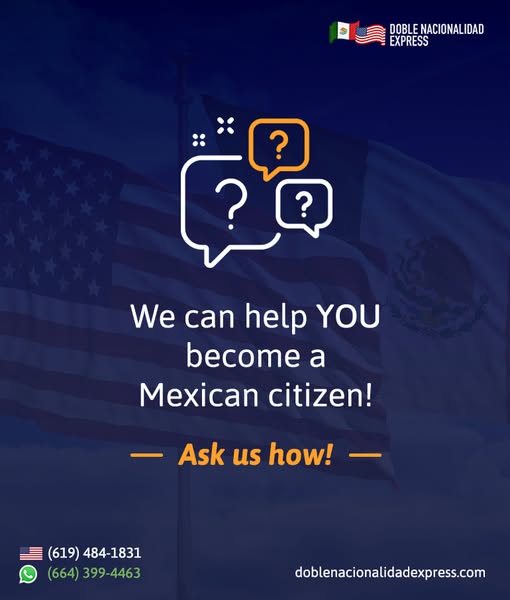
🗓️ Call or Message Us on WhatsApp | Schedule a Free Case Review
Your roots, your rights, and your family legacy are worth doing this the right way. We’d be honored to help you get there.

